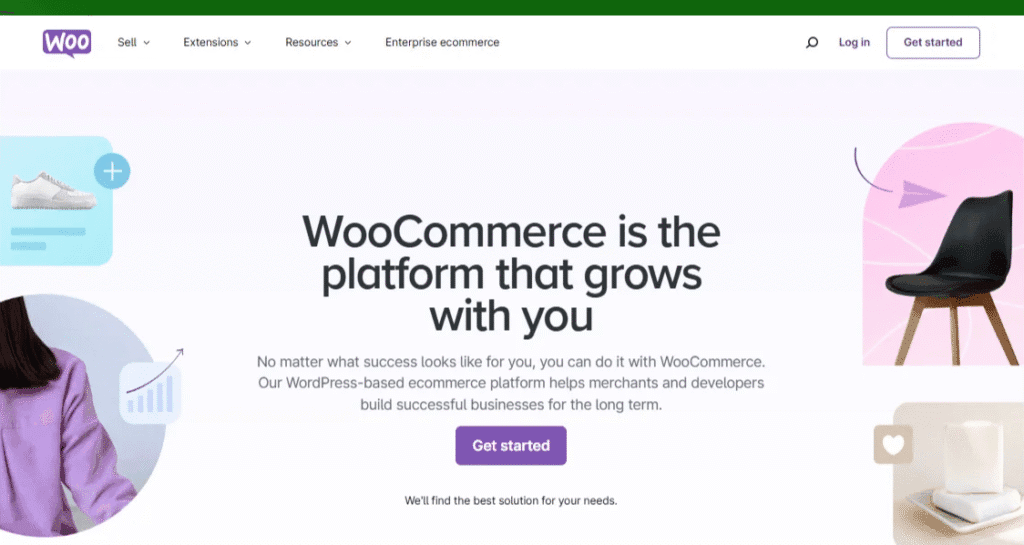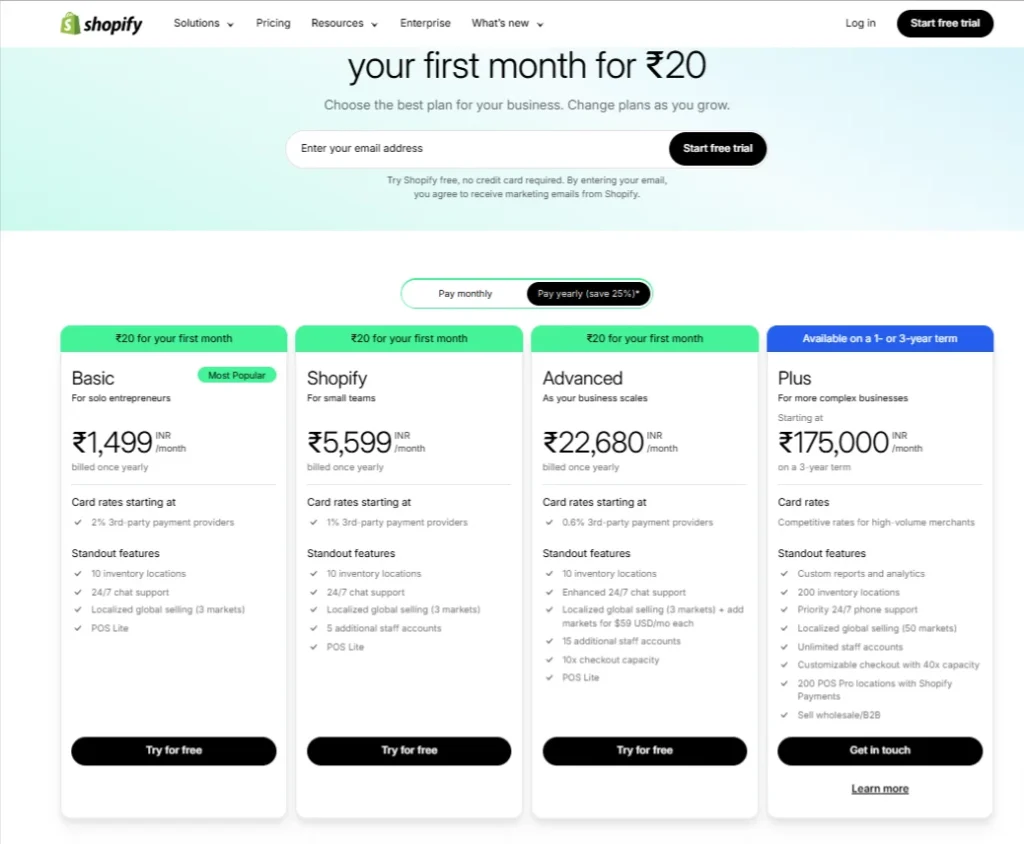
E-commerce is booming worldwide, and choosing the right platform for your online store is more important than ever. WooCommerce and Shopify are two of the most popular options for entrepreneurs and businesses today. To help you make the right choice, this guide compares WooCommerce vs Shopify across key factors like pricing, functionality, ease of use, design, and scalability so you can decide which platform is best for your business.

Shopify is a fully hosted e-commerce platform that provides everything you need to build and run an online store. As an all-in-one solution, it takes care of hosting, security, software updates, and other technical aspects, allowing you to focus on growing your business.
Key Features of Shopify:
Fully hosted solution – No need for separate hosting; Shopify manages everything from servers to security.
Ease of use – Simple drag-and-drop interface with customizable themes makes it easy to design your store without coding.
Integrated payment gateway – Shopify Payments supports credit cards, Apple Pay, PayPal, and more, helping reduce transaction fees.
Mobile-friendly – All themes are responsive, ensuring your store looks great on smartphones and tablets.
24/7 customer support – Assistance available anytime via phone, email, or live chat.

WooCommerce is a powerful open-source plugin for WordPress that transforms your website into a fully functional e-commerce store. Unlike Shopify, WooCommerce gives you complete control over your store’s design, functionality, and data, but it also requires you to handle hosting, security, and other technical aspects yourself.
Key Features of WooCommerce:
Free core plugin – WooCommerce is free to install, though you’ll need to pay for hosting, SSL certificates, and premium extensions to unlock advanced features.
WordPress integration – Seamlessly integrates with WordPress, making it easy to combine your online store with blogging and SEO capabilities.
Highly customizable – With access to thousands of plugins and themes, WooCommerce provides unmatched flexibility for customization.
Open-source platform – Developers can extend WooCommerce’s functionality to meet unique business needs.
Scalability – Works for small businesses as well as large enterprises, with the ability to add advanced features as your store grows.
When comparing WooCommerce and Shopify, the differences become clearer once you look at them side by side. Here’s a breakdown of how each platform performs across the most important features:
| Feature | Shopify | WooCommerce |
|---|---|---|
| Ease of Use | Extremely user-friendly, no technical skills required. | Requires technical knowledge for hosting, installation, and management. |
| Cost | Monthly subscription starting at $29, plus possible transaction fees. | Free plugin, but costs for hosting, SSL, and premium extensions. |
| Customization | Limited flexibility without coding or paid apps. | Highly customizable with thousands of plugins and themes. |
| Scalability | Scales smoothly with apps and integrations—ideal for fast-growing stores. | Very scalable, but requires technical setup and strong hosting. |
| Support | 24/7 support available via phone, email, and live chat. | Community forums are free; paid support options also exist. |
| Security | All security is handled by Shopify. | Security is your responsibility, but many plugins are available. |
| Hosting | Hosting included with Shopify Payments and external gateways. | Requires self-hosting and server management. |
| Payment Gateways | Built-in options like Shopify Payments, PayPal, and Stripe. | Supports a wider range of gateways, though some need plugins to integrate. |
Choose Shopify if you want a beginner-friendly, all-in-one solution with hosting, security, and support handled for you.
Choose WooCommerce if you prefer flexibility, customization, and complete control over your store’s design and data.
While WooCommerce offers unmatched flexibility, it also comes with responsibilities that may not suit every business owner. Here’s a clear breakdown:
| WooCommerce Pros | WooCommerce Cons |
|---|---|
| Cost-Effective: Free plugin with minimal upfront costs. | Requires Technical Knowledge: Setup requires familiarity with WordPress, hosting, and plugins. |
| Full Control & Customization: Complete control over store design, features, and functionality using themes and custom code. | Maintenance Responsibility: Requires regular updates and security maintenance for WordPress, plugins, and hosting. |
| Flexibility & Extensibility: Thousands of plugins available to add features like payment gateways, analytics, and marketing tools. | Hosting Management: You must manage third-party hosting providers, which can affect performance and uptime. |
| Ownership of Data: Full ownership of your store’s data, content, and customer information. | Security Responsibility: Store security depends on your hosting provider; extra plugins may be needed for safety. |
| Scalability: Can grow with your business by adding resources, server capacity, or advanced features. | SEO Complexity: SEO setup and management may be more complex than Shopify. |
| Wide Range of Integrations: Connects easily with CRMs, marketing tools, and external systems. | Limited Support Options: Community-driven support; premium support is usually paid. |
| No Built-In Transaction Fees: WooCommerce itself does not charge transaction fees. | Additional Transaction Fees: Third-party gateways (PayPal, Stripe) may charge transaction fees. |
Shopify is popular for its simplicity and fully hosted setup, but like any platform, it comes with both benefits and trade-offs. Here’s a clear breakdown:
| Shopify Pros | Shopify Cons |
|---|---|
| Ease of Use: Very simple to set up and manage with no technical skills required. | Monthly Subscription Fees: Shopify charges ongoing monthly fees, starting from $29. |
| Hosted Solution: Includes hosting, automatic updates, and security. | Limited Customization: Fewer customization options compared to WooCommerce; advanced features may require coding or premium plans. |
| Excellent Customer Support: 24/7 support available via chat, email, and phone. | Less Control Over Data: Shopify controls hosting and data, making migration more complex. |
| Built-In Security: SSL, PCI compliance, and automated updates included. | Extra Costs for Add-Ons: Many apps, integrations, and advanced features require extra payment. |
| Mobile Optimization: All themes are mobile-friendly and responsive. | Limited Payment Gateways: Fewer options compared to WooCommerce, especially for international stores. |
| Fast Setup: Quick and easy to launch a store without technical setup. | Pricing & Scalability Costs: Higher-tier plans and add-ons can increase costs as your business grows. |
| Built-In Marketing Tools: Comes with features like email marketing, discounts, and social integrations. |
WooCommerce is often seen as the more cost-effective option, especially if you value flexibility and complete control over your website. Since WooCommerce is a free WordPress plugin, you won’t pay a monthly subscription fee just to use the platform. However, there are other costs you’ll need to factor in when running a WooCommerce store:
Hosting Costs – WooCommerce requires a hosting provider. Basic hosting plans start around $5 to $30 per month, with premium options offering more storage, bandwidth, and performance features. Choosing the right plan allows you to scale your store affordably.
Domain and SSL Certificate – A domain name typically costs $10–$15 per year. You’ll also need an SSL certificate for security. Many hosting providers include SSL for free, while others charge an additional fee.
Plugins and Extensions – WooCommerce’s flexibility comes from plugins. Advanced features like marketing tools, shipping calculators, or inventory management often require paid extensions. These can range from $30 to $100 per year per plugin, depending on the complexity.
Themes and Design – WooCommerce provides free themes, but premium designs with advanced customization usually cost $50 to $100.
Development Costs – If you don’t have technical expertise, you may need to hire a developer for setup, customization, or ongoing support. Costs vary depending on your requirements.

Shopify simplifies the process of launching an online store by offering a fully hosted, all-in-one solution. Unlike WooCommerce, there’s no need to worry about separate hosting, security, or software updates—everything is included. Shopify offers three main pricing plans:
Basic Shopify ($39/month) – Best for new businesses with small sales volumes.
Shopify ($105/month) – Designed for growing businesses that require advanced features.
Advanced Shopify ($399/month) – Ideal for large businesses handling high transaction volumes and requiring detailed reporting.
While Shopify’s pricing looks straightforward, it’s important to be aware of the extra costs that come with running a Shopify store:
Transaction Fees – If you use a third-party payment gateway, Shopify charges fees ranging from 2% on Basic to 0.5% on Advanced plans. Using Shopify Payments eliminates these fees.
Credit Card Fees – Shopify charges 2.9% + $0.30 per online credit card transaction in the U.S.. International transactions may cost up to 3.6%.
Apps and Add-Ons – While Shopify includes free apps, many advanced features require paid apps. These recurring fees can increase quickly as your store grows.
Both WooCommerce and Shopify are excellent e-commerce platforms, but the right choice depends on your business goals and technical comfort level.
Choose WooCommerce if you want full control, flexibility, and scalability at a lower upfront cost and are comfortable managing hosting and plugins.
Choose Shopify if you prefer a beginner-friendly, fully hosted solution with 24/7 support—even if it comes with higher monthly costs.
At the end of the day, the “best” platform isn’t universal—it’s about what’s best for you.
At YatraTechie, we help businesses select and build the right e-commerce solution—whether it’s WooCommerce, Shopify, or something else. Our team ensures your store is optimized for performance, SEO, and conversions so you can grow faster online.
Ready to launch your store? Get in touch with us today and let’s build the perfect e-commerce website for your business.
View all
Need help? Let’s chat!